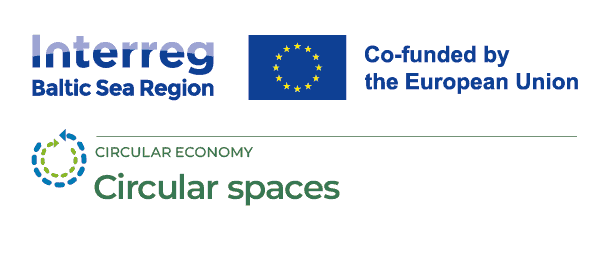
Only 40% of Construction and Demolition Waste Are Reused. How to Develop More Environmentally Friendly Innovation?
04 March 2024
Shifting the focus away from result-orientation
“Makerspaces go hand in hand with building prototypes, fostering innovation and creativity. These spaces become not only open creative hubs but also places for learning about sustainability, education, and laboratories for applying new practices. This allows experimenting with new, environmentally friendly solutions and technologies, while at the same time developing responsible consumption and production practices,” says Živilė Paužaitė, Head of Quality at Tech-Park Kaunas and representative of the project team of the Circular Spaces project in Lithuania, Interreg BSR program, which applies circular economy principles to the Baltic Sea Region makerspaces.
The expert emphasises the importance of not only finding new ways to create more sustainably, but also of engaging the public in a discussion about sustainable product design, waste reduction, and recycling. This not only raises awareness of sustainability but also empowers makerspaces’ communities to design responsibly and be aware of the environmental impact of their actions. Dr. Lina Šeduikytė, a researcher at KTU, complements her thoughts.
“Creative processes not only have a result but also costs and environmental consequences. Newly developed products often require additional resources and generate waste, which may not be very environmentally friendly. One of the key aspects of sustainability in a makerspace is the responsible use of resources. This means giving preference to recycled or sustainably produced materials and reducing waste. For example, 3D printers can be used to choose biodegradable plastics,” highlights Dr Lina Šeduikytė.
Growing amount of construction waste
Research shows that applying circular economy principles to sustainability practices in the construction sector and the design of creative spaces can significantly reduce the use of new resources. One such example is the Resource Rows project in Copenhagen, Denmark, where the facade of a new building was created from materials from an old building.
“It is predicted that the construction sector globally could generate around 2.2 billion tonnes of construction and demolition waste by 2025. Currently, only about 40% of this waste is reused or recycled. One solution is to apply a demolition-friendly design, which makes it easier to recycle and reuse construction materials. This is similar to the Lego concept, where building parts are designed to be easily dismantled and reused in other projects,” says Dr Šeduikytė.
Recycled building materials, such as concrete, wood, metals, and plastics, can be used both for the production of new products and the renovation of existing elements. In construction, recycled concrete can quite often be used to produce new concrete or as a base for road surfaces.
Test the training program
“It is not only progressive large corporations, especially those working in environmental fields, that are investing in finding more sustainable materials and solutions. These trends are primarily driven by startups developing innovations with scientists in a university environment. It motivates to notice that the joint creations of startups and scientists are not only making their way to the markets but also attracting attention in the global innovation ecosystem and motivating the big players”, sums up the Head of Quality at Tech-Park Kaunas, Živilė Paužaitė.
This spring, Interreg BSR’s Circular Spaces team will test a training program based on circular economy principles for open workshop operators and visitors, SMEs, business support providers, and regional organisations. “While Tech-Park Kaunas will focus more on Kaunas and the Lithuanian ecosystem and its actors, an international project team of the Circular Spaces project co-financed by the Interreg BSR program, plan to cooperate and exchange best practices and sustainable solutions with the whole Baltic Sea region,” says Vaiva Kelmelytė, Director of Operations at Tech-Park Kaunas, representative of the project team of the Circular Spaces project in Lithuania.
Tech-Park Kaunas





